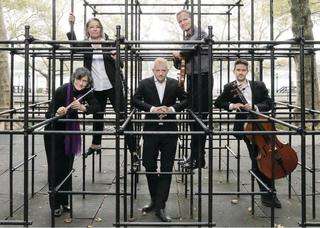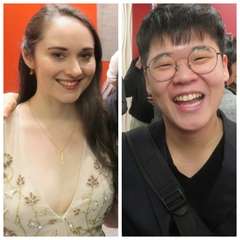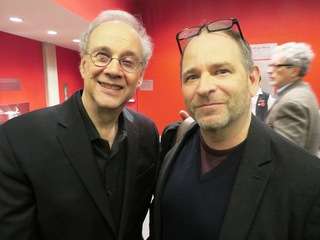|
Back
Hildy, Ya Don’t Look a Day Over 899 New York
Merkin Concert Hall, Kaufman Music Center
10/30/2019 -
Louis Karchin: Ancient Scenes
Jihyun Kim: Once Upon a Time
Jonathan Dawe: On Again, Ockeghem
Cynthia Folio: Through Window’s Lattices
Bruce Adolphe: And All Is Always Now
Vasiliki Krimitza: Aeoliás
Da Capo Chamber Players: Patricia Spencer (Flute), Marianne Gythfeldt (Clarinet), Curtis Macomber (Violin), Chris Gross (Cello), Steven Beck (Piano); Guest Artists: Marisa Karchin (Soprano), John Ferrari (Percussion), Louis Karchin (Conductor)

P. Spencer, M. Gythfeldt, S. Beck, C. Macomber, C. Gross
(© Beowulf Sheehan)
“When the footpads quail/At the night-bird’s wail/And black dogs bay at the moon,/Then is the spectres’ holiday/Then is the ghosts’ high noon!/Ha! Ha!/Then is the ghosts’ high noon!”
W.S. Gilbert (1836-1911), from Ruddigore
The Muses are ghosts. And sometimes they come in uninvited.”
Stephen King (1947-)
That so stolidly christened Da Capo Chamber Players gave listeners a so serious Halloween Eve celebration last night. An Eve filled with fairy tales, a birthday party for a 900-year-old singer, a solemnization of Renaissance church modes, the sounds of a shaman flute, a metaphysical sonata of time repeating itself, and the poetry of an Irish bard whose words turn the mundane into magic.
This was not a Halloween for trick-or-treaters or East Village boozy bar-goers. The Da Capo Chamber Players, with an unorthodox ensemble, and various incarnations of performers, will celebrate a half-century of premieres next year. Five of the six composers are established (if hardly Establishment) artists, while the sixth, a graduate student at Cornell whose music is widely played, gave a wizardly example of writing, with the opening Once Upon a Time.

M. Karchin/J. Kim (© Samuel A. Dog)
Like Suk’s Fairy Tale, Jihyun Kim didn’t have a particular story in mind. Yet his sextet produced all the elements of a fairy tale, almost audibly notated. No this was not a Til Eulenspiegel literal reproduction. Rather, Mr. Kim gave us first a jaunty woodland walk (those dotted eighth-notes with sixteenth-notes do all the walking), then idyllic moments, musical sections of fear, of fighting, of fright, ending with (hopefully) a resolution.
It was difficult for each of the players, yet the effect was pure light. One might suggest that, when Mr. Kim simplify the parts with short pauses, any school band could play it, with the schoolkids making up their own stories.
It could be a Peter and the Wolf in the making.
Vasiliki Krimitza’s Aeoliás was named for Homer’s minor god (and island) of Wind. This was a work of pure sound. Our “wind” was flutist Patricia Spencer, the other sound was an extraordinary guest percussionist, John Ferrari. (Not that all of Da Capo’s players weren’t extraordinary, but Mr. Ferrari’s consortium of instruments was like a Mahlerian orchestra in itself.)
This eccentric pairing of sounds gave a new picture of both instruments. Ms. Spencer’s flute echoed out like a Mongolian or Korean shaman (yes, it was Halloween Eve), Mr. Ferrari imitated, counterpointed and blended hand in glove.
As an unashamed celebrant of musical puns, I would have sanctified Jonathan Dawe even without his music. Who could forgive the title On Again, Ockeghem? Though in fact, it was a studious study of the mathematically mad 15th Century composer Johannes Okeghem. (“Was he Flemish?” “No he was 100 percent Flem.”)
Mr. Dawe produced a suitably complex quintet, with a structure one might label “variations without a theme”. Each of the dozen-odd sections, offered a different complexity of form, with configurations that any Renaissance musicologist might relish. Motives were stated, broadened out, paused, and a new segment with different colors, different meters, was announced. If one couldn’t always get inside the music, Mr. Dawe produced, at times, the musical essence of another time, another place.
And one didn’t need to be a musicologist to enjoy the puzzles and the musical paradoxes.
Cynthia Folio didn’t need to conceal her reverence for another time. Yesterday was supposedly the 900th Birthday of Hilegard von Bingen, and Through Window’s Lattices was her song for the singer, composer, poet, mystic. No doubt parts of the Von Bingen chants were quoted here. What stood out was a highly pictorial first section, of a monastery, of raindrops on the roof, of confined cloisters. Later the singing was secreted in 21st Century musical revelations.
Bruce Adolphe’s repute is as widely known for the science of music (in his radio broadcasts and books) as in composition itself. For And All Is Always Now, he took a line from Eliot’s Four Quartets. The piece was suitably for violin and piano, since Eliot’s whole verse is worth repeating: “Not the stillness of the violin, while the note lasts,/Not that only, but the co-existence,/Or say that the end precedes the beginning,/And the end and the beginning were always there/Before the beginning and after the end./And all is always now.”
I make no pretense of going through the whole intricate work, save that the “always now” was a six-note theme repeated by pianist Steven Beck, repeated in different forms by Curtis Macomber. The work was dry, played with studied brilliance by the duo.

L. Karchin/J. Dawe (© Samuel A. Dog)
The last work on this most colorful concert was a seven-movement work for the entire ensemble, conducted by composer Louis Karchin, with three sections sung by the splendid lyric soprano Marisa Karchin.
This was a voice almost entirely in the upper register, confident, emotional when necessary, dramatic when needed, and–most important–articulated with diaphanous clarity.
That importance was because the words were by the Nobel Prize-winning poet Seamus Heaney, and on All Hallow’s Eve, one would be curséd for blurring his lyric verses.
The piece ran for 25 minutes, virtually all dissonant, all of it in Mr. Karchin’s own aether. Yet these words and these sensations, if not as tactile as the words, reached–if we allowed it–another level of our consciousness. And worth another hearing as well.
For this concert did not celebrate Homer’s dank House of Hades ghosts. These six composers seemed to have been inspired by Nabokov’s definition of the past: “The more you love a memory the stronger and stranger it becomes”.
Harry Rolnick
|